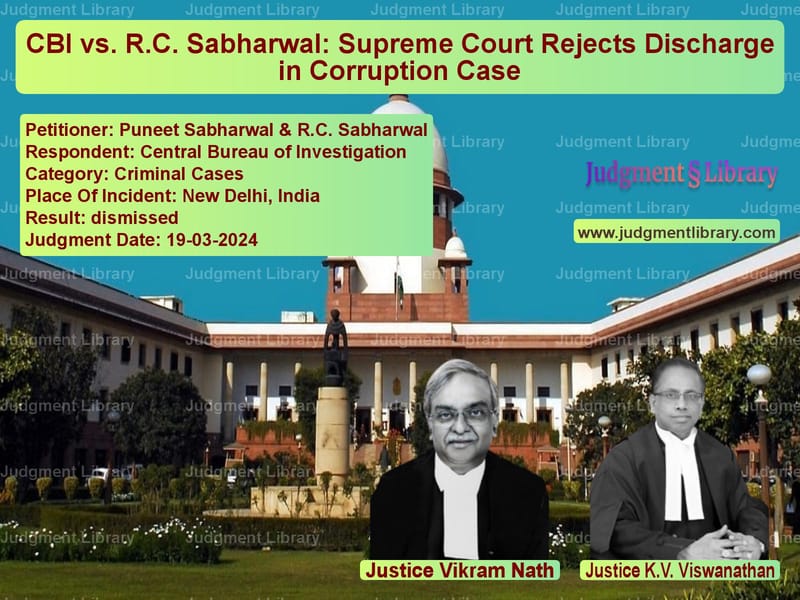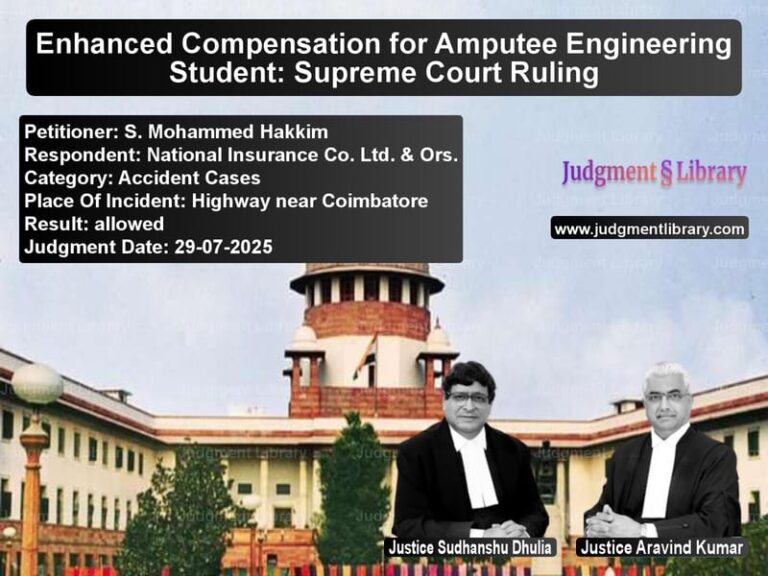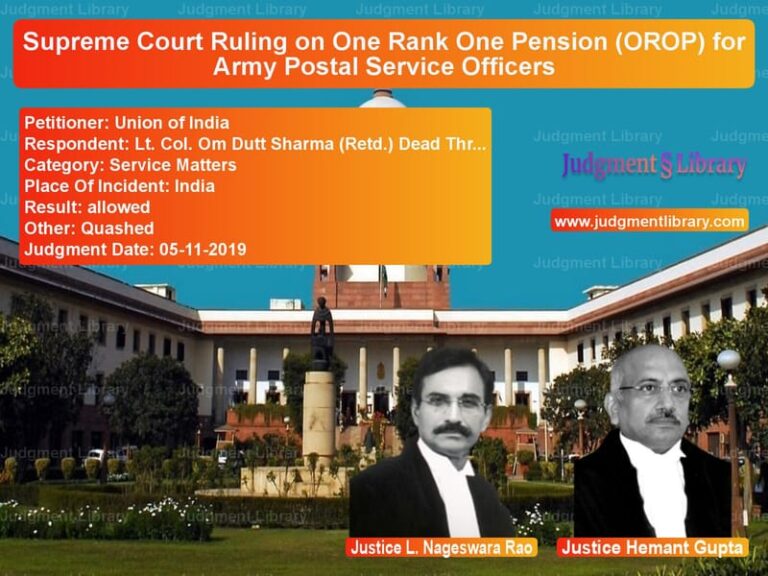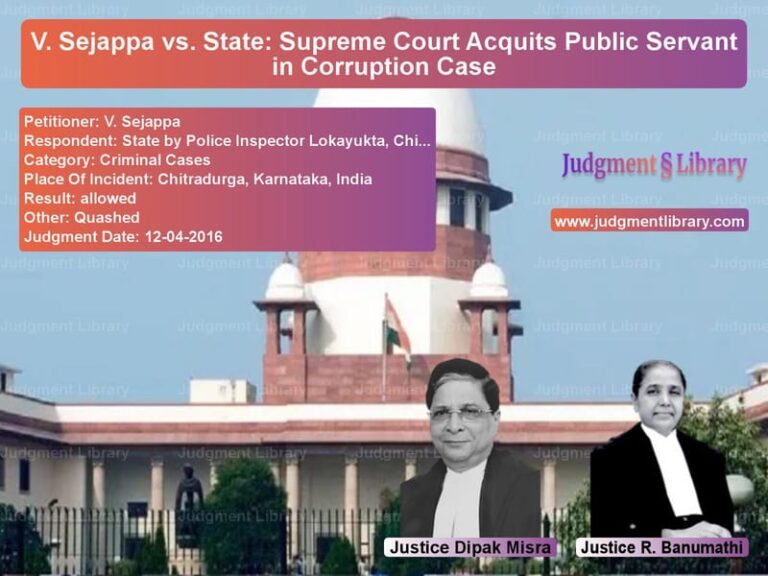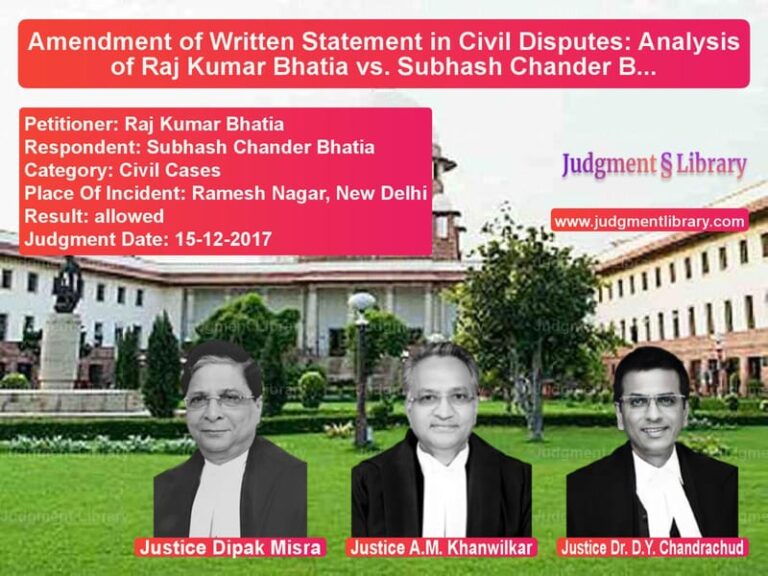CBI vs. R.C. Sabharwal: Supreme Court Rejects Discharge in Corruption Case
The Supreme Court of India has recently delivered a critical judgment in the case of Puneet Sabharwal & R.C. Sabharwal v. Central Bureau of Investigation, addressing allegations of corruption and disproportionate assets against a public servant and his family. The case, which originated from a charge sheet filed in 1995, revolved around the financial dealings of R.C. Sabharwal, a former Additional Chief Architect in the New Delhi Municipal Council (NDMC), and his son Puneet Sabharwal. The CBI accused them of possessing wealth disproportionate to their known sources of income and engaging in financial transactions meant to conceal illicit gains.
Background of the Case
The investigation began when the CBI’s Anti-Corruption Bureau filed an FIR against R.C. Sabharwal on 23rd August 1995, suspecting him of acquiring assets far exceeding his legitimate income. The charge sheet detailed that:
- Between 1968 and 1995, Sabharwal held properties and bank balances that did not align with his declared income.
- Twenty-four properties valued at Rs. 2.27 crores were allegedly acquired illicitly.
- His total income from salary and known sources was Rs. 1.23 crore, whereas he was found to own disproportionate assets worth Rs. 2.05 crore.
- His son, Puneet Sabharwal, was accused of abetting his father by facilitating the acquisition of wealth through a network of trusts and companies.
Charges and Legal Proceedings
On 21st February 2006, a Special Judge in Delhi framed charges against both accused under:
- Section 13(1)(e) read with 13(2) of the Prevention of Corruption Act, 1988, against R.C. Sabharwal.
- Section 109 of the IPC read with 13(1)(e) and 13(2) of the Prevention of Corruption Act against Puneet Sabharwal.
The accused challenged these charges in the Delhi High Court, which dismissed their petitions on 1st December 2020. Aggrieved, they moved the Supreme Court.
Petitioners’ Arguments
The petitioners, represented by senior counsel Mukul Rohatgi and Siddharth Agarwal, made the following arguments:
- The entire case was based on assumptions, as the assets in question were accounted for through legal income sources.
- The Income Tax Appellate Tribunal (ITAT) had already ruled in their favor in 2007, dismissing tax liabilities on the alleged wealth.
- Puneet Sabharwal was a minor for a substantial portion of the period under investigation and could not have conspired with his father.
- Reliance on Income Tax proceedings should have resulted in quashing the corruption case, as established in previous Supreme Court rulings.
CBI’s Arguments
The Additional Solicitor General K.M. Nataraj, representing the CBI, countered with the following points:
- The charges were not solely based on tax proceedings but on independent investigations.
- The ITAT’s findings did not conclusively prove the legitimacy of the accused’s income.
- The accused’s financial dealings through multiple firms and trusts indicated a pattern of concealing illicit wealth.
- Income Tax proceedings and criminal trials serve different purposes and are not interchangeable.
Supreme Court’s Observations
The Supreme Court upheld the High Court’s decision, emphasizing:
- Income Tax Orders Are Not Conclusive: The Court held that tax proceedings do not determine the lawfulness of income sources under the Prevention of Corruption Act.
- Prima Facie Case Exists: There was sufficient material to warrant a full trial, and the allegations could not be dismissed at the pre-trial stage.
- Probative Value of Tax Rulings: The Court noted that while tax orders may be used as defense evidence, they do not automatically nullify corruption charges.
Key Judicial Remarks
The Supreme Court reinforced its decision with the following observations:
“Even if the Income Tax Appellate Tribunal accepted the explanation of the accused, it does not absolve them from the charges of possessing disproportionate assets. A criminal trial must proceed independently based on the material before the court.”
On the relevance of tax proceedings in criminal cases, the Court remarked:
“Income Tax assessments focus on tax liability and not the legality of income sources. Therefore, findings in tax cases do not automatically prove innocence in a corruption case.”
Final Judgment
The Supreme Court dismissed the appeals of both accused, directing that:
- The criminal trial against the accused must proceed to its logical conclusion.
- The trial court should conclude proceedings by 31st December 2024.
- Observations made in the judgment should not influence the trial’s outcome.
Conclusion
This judgment reaffirms that tax exonerations do not shield individuals from criminal prosecution for corruption. It establishes that criminal trials require independent adjudication of evidence and reinforces the legal stance that allegations of disproportionate assets must be scrutinized based on broader investigative findings rather than tax rulings alone.
Petitioner Name: Puneet Sabharwal & R.C. Sabharwal.Respondent Name: Central Bureau of Investigation.Judgment By: Justice Vikram Nath, Justice K.V. Viswanathan.Place Of Incident: New Delhi, India.Judgment Date: 19-03-2024.
Don’t miss out on the full details! Download the complete judgment in PDF format below and gain valuable insights instantly!
Download Judgment: puneet-sabharwal-&-r-vs-central-bureau-of-in-supreme-court-of-india-judgment-dated-19-03-2024.pdf
Directly Download Judgment: Directly download this Judgment
See all petitions in Money Laundering Cases
See all petitions in Fraud and Forgery
See all petitions in Public Interest Litigation
See all petitions in Judgment by Vikram Nath
See all petitions in Judgment by K.V. Viswanathan
See all petitions in dismissed
See all petitions in supreme court of India judgments March 2024
See all petitions in 2024 judgments
See all posts in Criminal Cases Category
See all allowed petitions in Criminal Cases Category
See all Dismissed petitions in Criminal Cases Category
See all partially allowed petitions in Criminal Cases Category

